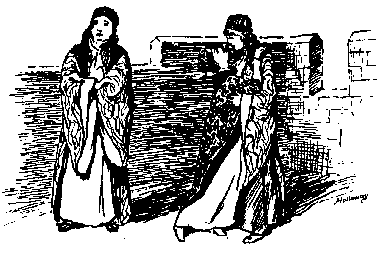Gilbert & Sullivan Opera
A History and a Comment
by H. M. Walbrook
CHAPTER IX.
A STRING OF PEARLS.

PRINCESS IDA, or Castle Adamant, was produced at the Savoy on January 5th, 1884. It is the only opera of the series written in three Acts. It satirizes the Women's Rights movement, and is respectfully admitted by the author to have been inspired by Tennyson's poem, "The Princess." The last lines spoken in the opera are taken direct from that epic. The story of the opera tells of the love of Prince Hilarion for Princess Ida, daughter of King Gama, to whom he had been married in babyhood, of the Princess's absorption in her ideals and responsibilities as head of a college for ladies, of the collapse of her belief in woman as the ruling sex, and of her final surrender to her husband lover. The characterisation is better than the plot; the music is better than either. The figures of the grumbling King Gama, of his idealistic daughter, of the Lady Blanche (Professor of Abstract Philosophy at the College), of Hilarion's friend, Cyril, a typical "bounder" of the type of Shakespeare's Gratiano in The Merchant of Venice, and of Ida's three preposterously swaggering and pusillanimous brothers-all these are rich in felicitous touches.
In its first form the extravaganza had been produced fourteen years before at the Olympic Theatre, to music of the day adapted to it. In that production Ida's brothers were impersonated by three actresses. At the Savoy, when the "book" reappeared with Sullivan's music, all the men's parts were played by men. The piece was brilliantly successful on the first night, and the author has left us an amusing story of that occasion. During the third Act he was sitting in the green room quietly enjoying the evening paper, when suddenly the door was burst open and in rushed the French armurier who had provided the very handsome suits of armour worn by the principal ladies for the battle scene. "Mais, monsieur, savez vous que vous avez là un succès solide?" cried the excited Gaul. "Oh! it seems to be going very well," replied Gilbert. " Mais vous tes si calme!" protested his visitor, evidently quite outraged at the spectacle of British phlegm. In telling the story afterwards Gilbert added: "I suppose he expected to see me kissing all the carpenters."
Towards the end of the first Act of this opera occurs one of Sullivan's most charming melodies in the trio beginning "Expressive glances." Right through the second Act the author and composer are both at their height. Psyche's ballad, "The Ape and the Lady," Lady Blanche's list of punishments, Melissa's lines -
"Are men," she would have added, but "Are men"
Stuck in her throat!
- all these are richly comic. The lyric, "Whom thou hast chained," is worthy of Herrick. The music of the whole of this second Act is a string of pearls. To sit listening to a succession of melodies, each so exquisite and each so different from the others, as those of the trio "I am a maiden cold and stately," the quartette "The world is but a broken toy," the quintette "The woman of the wisest wit," and Cyril's wild song "Would you know the kind of maid," is to enjoy a pleasure rare indeed. The third Act is short and less interesting than the others. The best song in it is that in which Arac and his two brothers shed, one after the other, their helmets, cuirasses, brassets, and leg-pieces. The Act and the opera come to an enchanting end with the repetition, as a solo and chorus, of the melody of "Expressive glances."
